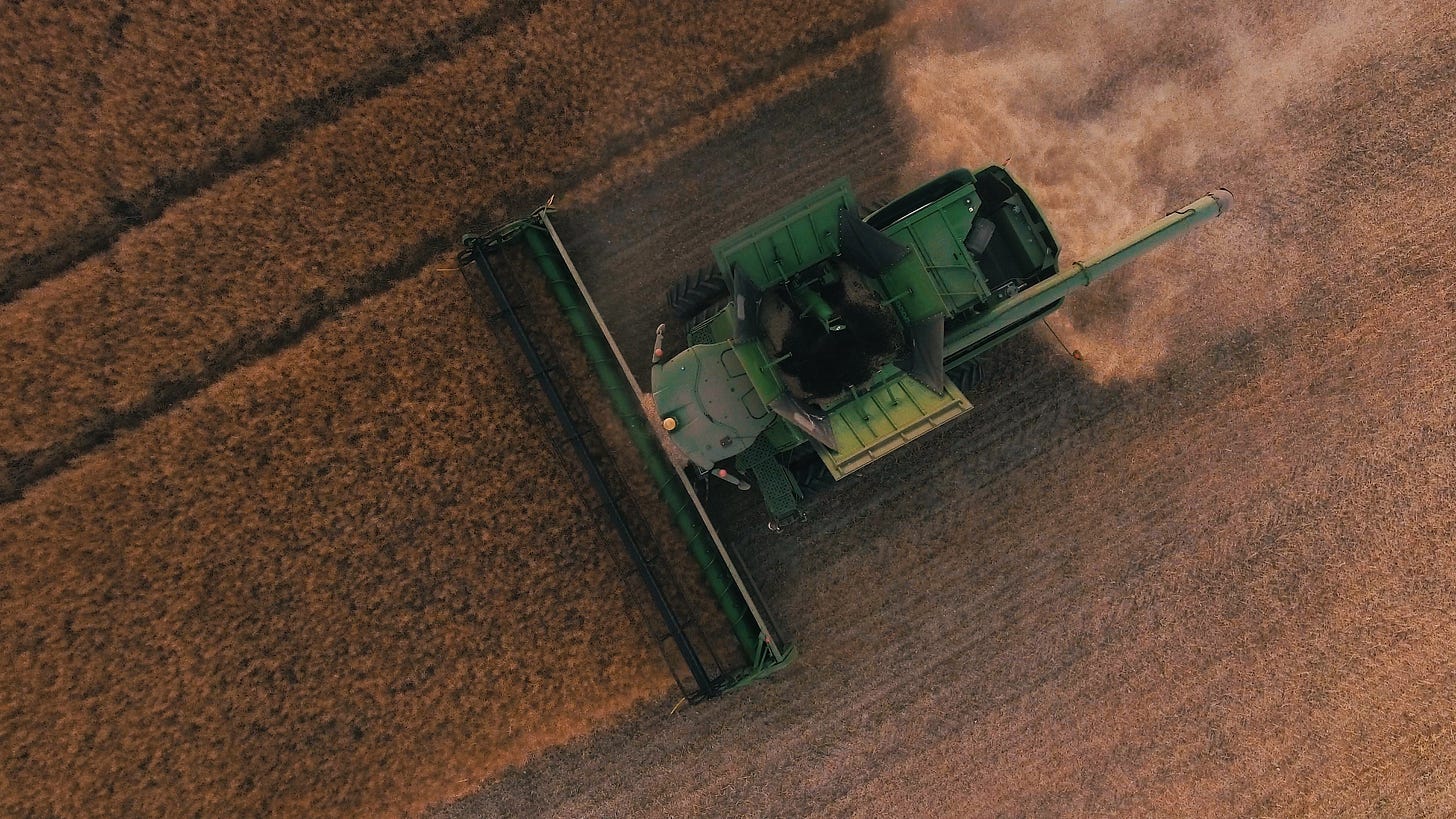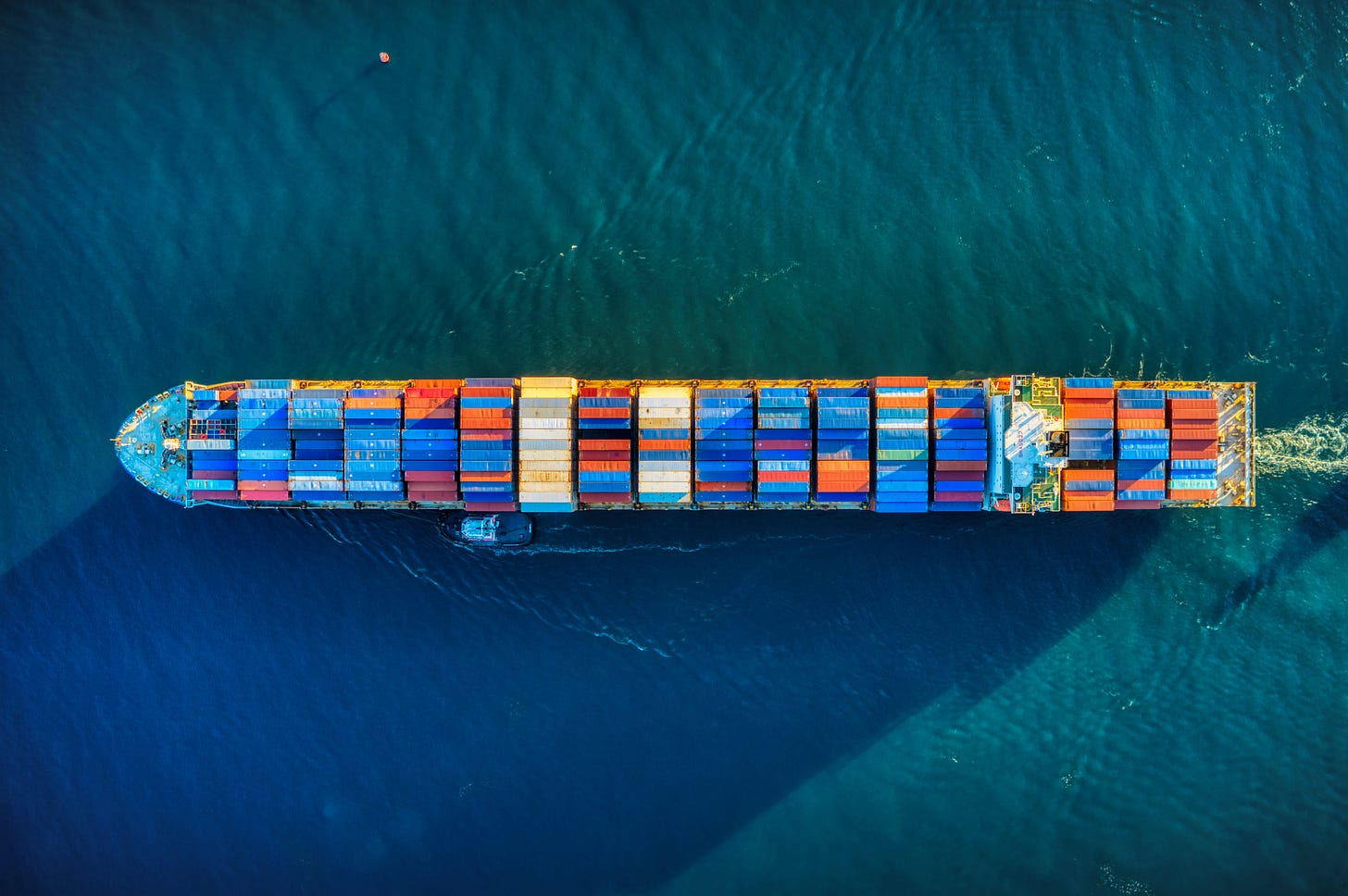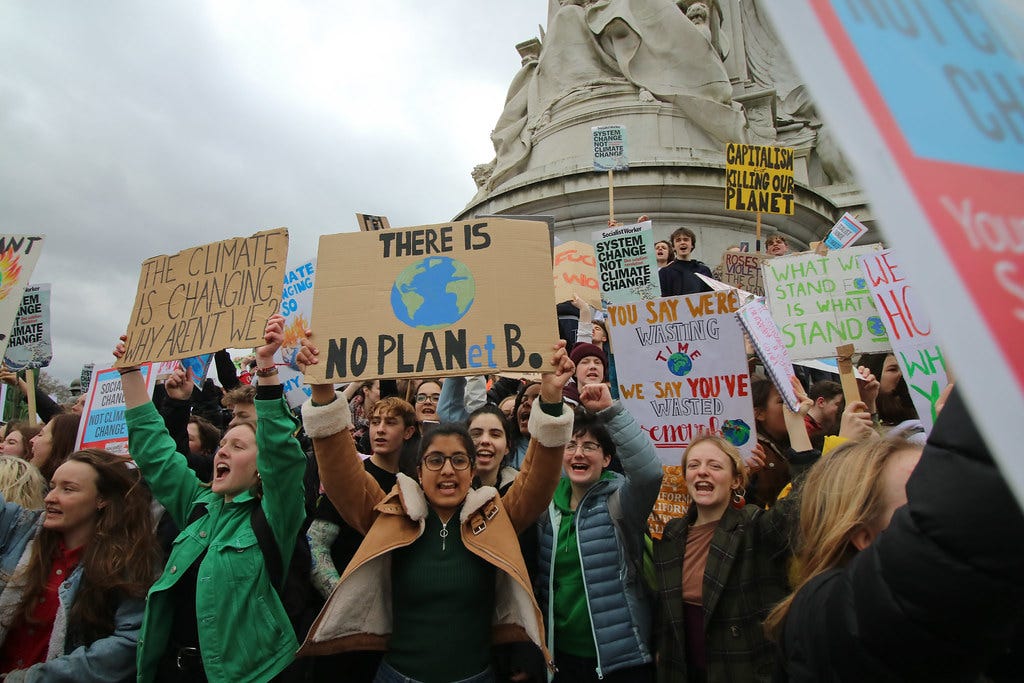Are climate conferences radical enough?
Boycotting conferences and stirring up civil disobedience around them is now commonplace. Why? Plus, an interview all about fostering new ocean technology.
🌏 Thanks for signing up to engage with small, purpose-driven media. If you get value from what we’re doing, please consider supporting us by becoming a paid subscriber. This will ensure we can keep publishing forward-thinking environmental journalism. 🌏
The problem with climate conferences: towards a more radical approach
From the UNFSS to COP26, global climate talks are being accused of favouring the status quo: corporate interests and techno-fixes. By Georgie Hurst.
The transformation of our food system is necessary if the world is to meet the UN’s Sustainable Development Goals of zero hunger by 2030 and net-zero emissions by 2050. According to the UN, food systems are responsible for one-third of global greenhouse gas (GHG) emissions, while more than 8.9 percent of the world population are still hungry.
The future of global food security also, of course, depends on rapidly adapting agriculture to a changing climate.

Increased discussion of the food/climate link, and of the need for agricultural transformation, led to the first ever UN Food Systems Summit (UNFSS) last month. Something quickly became clear at the conference. This will be no simple problem-solving exercise. Like the energy sector, food is occupied by multiple stakeholders – with conflicting agendas and notions of sustainability.
The UNFSS was particularly mired in controversy for its ‘undemocratic’ agenda-setting processes. These arose out of private talks between the UN and the World Economic Forum.
Critics of the Summit cite the exclusion of civil society advisory groups from agenda-setting as a major concern. This includes the Civil Society and Indigenous Peoples’ Mechanism (CSM), which has existed in global food systems talks since the UN Committee on World Food Security in 2010.
Indigenous peoples steward 80 percent of the world’s biodiversity, but their way of life and food security is threatened by the intensification of agriculture.
And without meaningful consultation of these communities, the Summit is advancing the private sector’s high-tech solutions to food insecurity. Such solutions include those of the Alliance for a Green Revolution in Africa (AGRA), which is expanding the production of commodity crops on the continent. Arming small-scale farmers with fertilisers, pesticides, and “high-yielding” hybrid seeds, this attempt at improving incomes and reducing food insecurity is already failing, eroding Indigenous peoples' and farmers' subsistence livelihoods and associated biodiversity.
The UNFSS sidelined solutions favoured by organisations representing Indigenous peoples and small-scale farmers – like agroecological farming and food sovereignty. Hundreds of groups boycotted the summit, joined by committees of scientists and unions, as a result.
Countdown to COP26
With the 26th UN Climate Change Conference of Parties (COP26) in Glasgow less than a week away, a UK-based coalition sharing these values of justice and equity in climate talks is demanding that the conference prioritise human rights in its agenda.
Youth, scientists, NGOs, trade unions, activists, and civil society organisations make up the COP26 Coalition, organising to amplify the voices and demands of those on the frontlines of the climate crisis: predominantly Global South and Indigenous communities.
Inspired by the counter-summits that emerged resisting the UNFSS agenda, the Coalition is, Roz Corbett tells Ours to Save. “working to analyse and challenge the narratives and actions that multinational corporations are using in spaces such as COP.” Corbett is COP26 Coordinator at the Landworkers’ Alliance (LWA).
The Coalition is equally concerned about the private sector’s role at the COP26:
"It's no surprise that finance is the theme for the first day," says Corbett. "Free market approaches are openly pushed by the UK government."
COP26 has also received criticism for its inaccessibility to Global South participants, who are already facing the destruction of the climate crisis on their health, land, and livelihoods. Representation from these communities will be significantly lacking at the Conference in Glasgow, as vaccine apartheid and COVID-19 travel restrictions hit them hardest.
As a result, the COP26 Coalition is decentralising its approach to organising, with a Global Day of Action for Climate Justice planned for 6 November, and a virtual three-day People’s Summit with a programme of talks and workshops from 7 November.
“Movement building is a key goal of the coalition,” says Roz. And they hope that this work “can more effectively challenge” the various false solutions put forward by oil companies and greenwashing corporations.
7 questions with Alexis Grosskopf, CEO of Ocean Hub Africa
Based out of Cape Town, this incubator is fostering a multitude of innovative ways to protect our oceans. By Imaan Asim.
Ocean Hub Africa is an ocean-impact accelerator, providing business and product development services to startups geared towards cleaning up our oceans. Ours to Save spoke to CEO Alexis Grosskopf about working to change minds in tourism and shipping, biomimicry, and finding your purpose in life.
Could you tell us why you decided to start Ocean Hub Africa?
I don’t know if you’re familiar with the Japanese concept of Ikigai? Four circles in a venn diagram: what you’re good at, what you love, what the world needs and what you get paid for. At the centre is your purpose in life.
I was here in Cape Town, sitting on a rock by the ocean, thinking about what I could do that didn’t already exist. I have a background in environmental engineering and have been working in entrepreneurship for the last eight years.
Cape Town is the ideal place to set up an incubator for ocean technology and to create better relationships between the ocean and people.
Earlier this year you spoke on a panel at Imperial College London. What were the most innovative solutions you discussed regarding ocean plastics at this event?
One of the other speakers created a biodegradable algae-based plastic, which takes in carbon. It’s great that it becomes ocean food, because lots of plastic ends up in the ocean.
We also discussed one of our own startups, Shark Safe Barrier, which uses biomimicry. It mimics kelp forests to provide a natural alternative to shark nets.
Another one, Inseco, produces insect protein. This is huge for the ocean economy, saving money and providing an alternative to unsustainable overfishing.
How successful have you been in your mission to support ocean-focused startups so far?
That depends on how you define success. We started with 30 applicants for our first cohort and we've gone up to just under 150 for the second cohort. In terms of inspiring entrepreneurs and getting more people interested in this ocean-impact space, it is growing.
We are seeing more proposals with higher-level technology coming our way. There’s also more private capital going into sustainable ocean growth.
1000 Ocean Startups is something we are a part of, which brings together people who focus on sustainable life below water and positive ocean impact. We know the deadline is 2030 and we are running out of time.
Catalysing partnerships is important because oceans belong to everyone. If someone does something wrong in Panama, it can have an impact in the UK. We need to come together to see success. Especially with the first IPCC report in 2019, we see that looking after our oceans is a high priority for climate change.

You currently support startups across Africa with a goal to protect oceans around the world. Would you ever expand beyond the continent?
Our coalition, 1000 Ocean Startups, is an international one – but we are mainly looking at helping and growing African-based startups.
We don't see anyone else as competitors as they are usually ecosystem based, and our programme can still be used in other parts of the world, but our expertise is around the African economy and the blue ocean.
Your network is your net-worth so it is important we keep connected to what we know to see sustainable growth.
Could you tell us about your work with Dassault Systemes and how they are supporting Ocean Hub Africa’s mission?
Dassault Systemes provides a platform on the Cloud to our entrepreneurs, allowing them to design and virtually test prototypes before building them and putting them in the ocean. This saves money and means we know the product works before implementing them. Without this testing beforehand, the prototype could break.
Part of your work focuses on involving tourism and shipping industries with your mission. What are the responses to this usually like?
Tourism has been hit hard by COVID-19. One side has taken this time to pivot and become focused on coastal communities; it’s trying to be more sustainable, which is great. The other side isn’t able to do this due to the money constraints.
The majority of worldwide trade happens via shipping. This is heavily polluting; it will take a massive effort, with industries and governments coming together, to decarbonise shipping Efforts so far have been very warmly welcomed so far.

Finally, is there anything you would like readers at Ours to Save, or governments around the world, to know about the importance of protecting our oceans?
We already have most of the solutions; we already know a lot of the problems. What we are missing is action.
As an example, if we decide to stop using single use plastics and then the government bans single use plastics, it doesn't provide businesses with a solution to remove plastic from their shelves, so there needs to be an innovation to implement what the drivers want to see.
We need to think about how to best leverage the system as it exists, in order to shape things differently – to shift from a normal ocean economy to a blue ocean economy. Whilst we look at what is profitable for businesses, it is important that what we are doing has a relevant impact embedded into its DNA.







